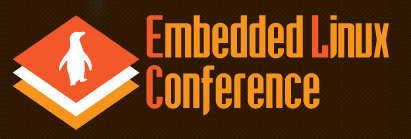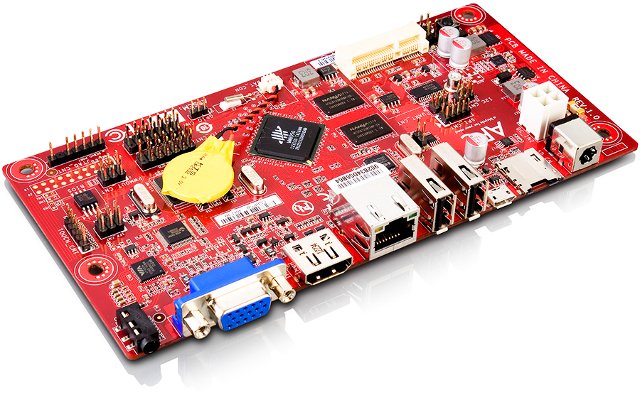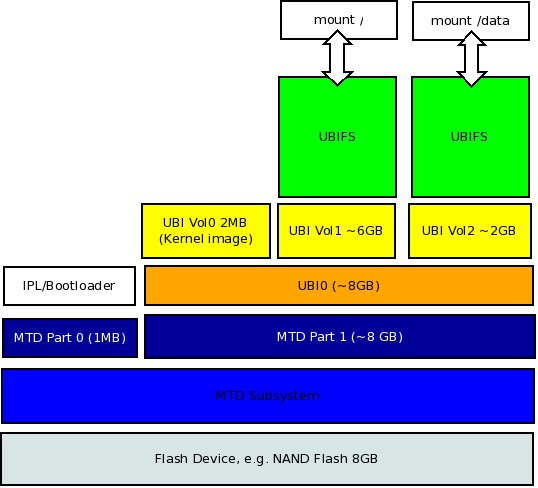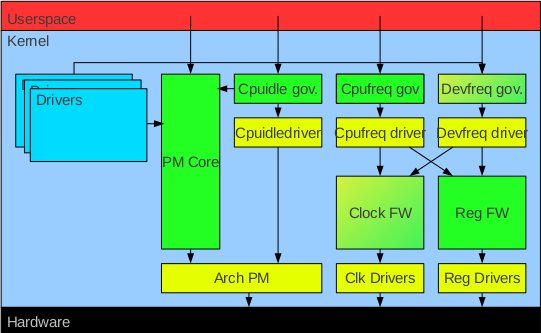FOSDEM is a 2-day (or 3 if you include Friday beer event) event where over 5,000 members of open source communities meet, share ideas and collaborate. It’s free to attend, and there’s no registration, so you just show up to attend. FOSDEM 2013 takes place on Feb 2-3 (yep, this week-end) in Brussels There are 7 main tracks where sessions are organized: Operating systems Open source challenges Security Janson Beyond operating systems Web development Miscellaneous Robotics There are also keynotes and devroom for a total of 488 sessions. Developers rooms that may particularly be of interest to readers of this blog are: Cross Desktop devroom – e.g. Wayland, gstreamer, razor-qt, Qt Project, Plasma Active, etc… Cross Distro devroom – e.g. Linux on Android, suse on ARM, ARMv8, systemd, etc… Embedded and mobile devroom – e.g. Baserock Embedded Linux, Guacamayo (Yocto), Nemo Mobile/ Mer project, arduino… All in all that’s a […]
Linaro 13.01 Release with Linux Kernel 3.8 and Android 4.2.1
Linaro has just announced release 13.01 which includes Linux Kernel 3.8-rc4 and Android 4.2.1. A lot of work seems to have gone in Arndale board and OpenEmbedded ARMv8. It’s the first time an Ubuntu image is released for Arndale Cortex A15 development board. One the kernel side some Android upstreaming work has been done, as well as some fixes for eMMC, and code for ST Ericsson Novathor 8500 SoC has been reorganized. Version 14 of the big.LITTLE MP (Multi Processing) has been released. The LEG has done further work on Linaro UEFI and GRUB. Here are the highlights of this release: Android Platform Work The first step of the android-build front-end update for new build program has been landed. Origen and Versatile Express manifests have been consolidated into a single manifest. linaro-android-tools were developed to improve development time for kernel developers. See Kernel Update Tools for details. The android-build scripts […]
Embedded Linux Conference 2013 Schedule
The Embedded Linux Conference (ELC 2013) will take place on February 20 – 22, 2013 at Park 55 Hotel in San Francisco, California. ELC consists of 3 days of presentations, tutorials and sessions. There will be over 50 sessions during those 3 days. I’ll highlight a few sessions that I find particularly interesting, and that did not get presented at ELCE 2012 (AFAICR). February 20 11:00 – Anatomy of the arm-soc git tree by Olof Johansson, Google We are now two years into the new maintainer model for ARM platforms, and we have settled down into a workflow that maintainers have adjusted well to. Still, when new platforms arrive, or when maintainer ship changes hands, there’s sometimes a bit of ramp-up in getting used to how we organize our git tree and how we prefer to see code submitted to fit that model. This presentation will give an overview of […]
LTSI 3.4 is Now Available for Download
Nearly 2 years ago, the Linux Foundation’s Consumer Electronics (CE) working group created the Long Term Support Initiative (LTSI) Linux kernel for consumer electronics devices in order to have a common stable platform released every 2 years, and share the kernel development work among competing companies including Hitachi, LG Electronics, NEC, Panasonic, Qualcomm Atheros, Renesas Electronics Corporation, Samsung Electronics, Sony and Toshiba. Last week, the CE working group has released LTSI 3.4 kernel, based on Linux 3.4.25 kernel release and including several backported features from newer kernels including: The Contiguous Memory Allocator (CMA), which is extremely useful for embedded devices that have very limited hardware resources and will better handle the large memory requirements of multimedia applications. CMA originally was merged into the 3.4.0 kernel release, but its functionality was quite limited. Since then, the feature has been significantly improved in the kernel.org releases and those fixes have been added to […]
VIA Announces $79 APC Rock & $99 APC Paper Cortex A9 Board and PC
Following the launch of the $49 APC ARM11 board as a Raspberry Pi alternative last year, VIA has just announced two new APC products based on a WonderMedia WM8950 Cortex A9 processor: APC Rock – $79 Android board APC Paper – $99 Android PC with a case made of recycled cardboard Both products run Android 4.0 (ICS) and mostly share the same specifications: SoC – VIA WonderMedia WM8950 ARM Cortex-A9 @800Mhz + Mali-400 GPU System Memory – 512 DDR3 SDRAM Storage – 4GB NAND Flash + microUSB slot Video Output – HMDI (Rock & Paper) and VGA (Rock only) Audio I/O – Audio out / Mic in combo Ethernet – 10/100 Mbps USB – USB 2.0 (x2) and microUSB (OTG) 20-pin ARM-JTAG header Extra GPIO, SPI and I2C busses on a header Dimensions (Board) – 170 x 85mm (W x H), Neo-ITX Standard. APC Paper is basically the same as […]
Video4Linux: Current Status and Future Work – ELCE 2012
Hans Verkuil, R&D software engineer at Cisco Systems Norway, talks about Video4Linux status, progress, and plans at the embedded Linux Conference in Barcelona, Spain, on November 7, 2012. Abstract: Video4Linux is a fast-changing subsystem where a lot of work is done to support the complex video hardware of embedded systems. This presentation will give an overview of the developments in the past year and the work that is planned for the near future. Hans covers SoC video devices support, core, control, and videobuf2 frameworks, HDTV timings & events API, video connector support, media controllers, codec & flash support, and more… You can also download the slides for this presentation. For further details about development, subscribe to linux-media mailing lists or chat on #v4l IRC channel on freenode. Jean-Luc Aufranc (CNXSoft)Jean-Luc started CNX Software in 2010 as a part-time endeavor, before quitting his job as a software engineering manager, and starting […]
UBI Fastmap – ELCE 2012
Thomas Gleixner, Linux kernel programmer at Linutronix, talks about UBI flash management layer, and fastmap implementation to speed up boot times at the Embedded Linux Conference Europe, on November 7, 2012. Abstract: UBI is a flash management layer in the Linux kernel designed to handle especially the shortcomings of NAND flash. UBI itself has the requirement to scan the full flash at boot time. With flash sizes becoming larger and larger this can take quite some time. A recent development implemented fast mapping functionality which is designed to put an upper bound on the number of flash eraseblocks to scan. This allows faster boot times without sacrifying the robustness of UBI. This talk gives an overview of the UBI fastmap design and looks at costs and benefits. The talk provides an overview of UBI and its shortcomings, and explains UBI fastmap implementation in details showing it provides significant speedup proportional […]
Debugging Embedded Linux (Kernel) Power Management – ELCE 2012
Tero Kristo, Linux kernel developer at Texas Instruments, explains how to debug power management in Embedded Linux at ELCE 2012. Abstract: The presentation will talk about debugging various problems a kernel developer can face when working with power management. These include hardware related issues (IC / HW layout bugs, bad documentation) and software related (kernel bugs, driver problems, adding new kernel features, bad userspace behavior.) Along with presenting some of these problems, I will discuss about ways to debug these… power management typically requires specific tools to be used. I will base the discussion on my first hand experience from working with Linux PM. Target audience is (kernel) software developers interested in power management. The presentation is divided into 3 sections: Debugging tools / methods for PM Disabling kernel features Stress testing Tracing (printk / low level UART) GPIO / LED trace Debugger Buffered traces / statistics with trace-cmd & […]








